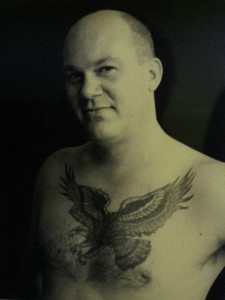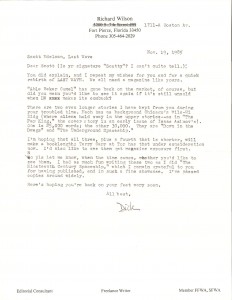Follow Scott
Recent Tweets
- Waiting for Twitter... Once Twitter is ready they will display my Tweets again.
Latest Photos
Search
Tags
anniversary Balticon birthdays Bryan Voltaggio Capclave comics Cons context-free comic book panel conventions DC Comics dreams Eating the Fantastic food garden horror Irene Vartanoff Len Wein Man v. Food Marie Severin Marvel Comics My Father my writing Nebula Awards Next restaurant obituaries old magazines Paris Review Readercon rejection slips San Diego Comic-Con Scarecrow science fiction Science Fiction Age Sharon Moody Stan Lee Stoker Awards StokerCon Superman ukulele Video Why Not Say What Happened Worldcon World Fantasy Convention World Horror Convention zombies
©2025 Scott Edelman
Unearthing my 1984 interview with Thomas M. Disch
Posted by: Scott
Tags:
Harlan Ellison, Isaac Asimov, John Crowley, Last Wave, Orson Scott Card, Ray Bradbury, Ron Goulart, Samuel R. Delany, science fiction, Thomas M. Disch, Vladimir Nabokov
Posted date:
March 1, 2015 |
1 Comment
More than 30 years ago, I conducted a lengthy interview with Tom Disch. How lengthy? Once transcribed, it came to nearly 18,500 words, and took up 48 pages of the Winter 1986 of Last Wave. I’ve been thinking of that interview ever since my recent share of an equally intensive interview with Chip Delany, and decided the conversation was worth reviving here. Tom, who was one of my instructors at Clarion in 1979, deserves to be remembered.
John Clute wrote this about Tom in the Science Fiction Encyclopedia:
Because of his intellectual audacity, the chillingly distanced mannerism of his narrative art, the austerity of the pleasures he affords, and the fine cruelty of his wit, Disch was perhaps the most respected, least trusted, most envied and least read of all modern sf writers of the first rank.
I’ve always been in awe of that description. Read on to see whether you agree it was deserved.
But before you begin, I feel a couple of trigger warnings are in order:
First—as part of a discussion of how Tom’s homosexuality might have affected his writing, I raised the issue of sex change operations in the context of how certain editors were biased against life choices choices they couldn’t understand. I cringed just now reading how I framed that question, because in the intervening three decades since I asked it, I’ve come to believe that’s a lousy term to describe what’s actually happening under those circumstances, which is the bringing about an alignment of one’s inner and outer selves. I’d never ask that question in the same way today—because I now think of the process as being not a change but a gender confirmation—and I’m sorry I raised the topic that way then. But in the interests of historical accuracy and not ducking responsibility, I’m leaving in the question as it was asked in 1984.
And as an addendum to that—if I’m putting my foot even more firmly into my mouth with the way I’m phrasing this trigger warning and apology, please feel free call me out on that, OK? My friends already know (I hope) that they’re free to do that, but I’d like the rest of you to know it, too.
As for second trigger warning—Tom makes a joking reference to John Norman novels and rape which I worry could be triggering for some. If you want to skip that completely, jump over the answer he gives to the question I raise about his review of a Ron Goulart novel.
Now that I’ve taken care of that—hoping that my attempts haven’t made things worse—here’s the entirely of the interview, as it appeared in the final issue of Last Wave.
Thomas M. Disch is one of the more talented and controversial figures in the science fiction field. His body of work encompasses short stories, novels, poems, opera libretti, essays, book reviews, and now even an interactive novel. In every instance he has chosen to work at a level of ambition of which only a handful of other genre writers share in the attempt. He has created works of a remarkably high quality, and at the same time enraged many for his failure to fall into the lockstep of genre requirements. The following interview took place on August 11, 1984 in Tom Disch’s Manhattan apartment.
Last Wave: I think of you as being a joyful writer, as opposed to being the depressing writer which many other people seem to paint you. In your early novel The Genocides, for instance, which is one often given as an example of a depressing work because the benign, indifferent aliens win, I find triumphal joy, for the protagonists in it do triumph with dignity against great odds over the human evil around them. In your recent On Wings of Song, which I’ve read one reviewer claim to be a cynical book, I see a happy ending: David Weinreb does get free and fly. For some reason many people prefer to see him as dying. In rereading these two works and all else inbetween, I just don’t see the cynicism which the overwhelming majority of readers chooses to focus on. Why do you think there is this myth of your work being such a downer? (more…)
The Richard Wilson short story collection you never got a chance to read
Posted by: Scott
Tags:
Last Wave, Richard Wilson, science fiction, Terry Carr
Posted date:
March 16, 2012 |
1 Comment
Remember Richard Wilson? Some of you might, but alas, most probably don’t. Wilson won the Nebula Award for Best Novelette in 1968 for “Mother to the World” (which got him a Hugo nomination, too), and I published his “The Nineteenth Century Spaceship” in Last Wave back in 1984. He died in 1987, and is now mostly forgotten except to the cognoscenti.
John Pelan of Ramble House is publishing a series of books collecting his short stories—the first volume of which is now on sale, and he got in touch with me to see whether I still had copies of the magazine he could use to help in reprinting that latter story.
But I’d hung on to more than just that. I also had our correspondence regarding that and other submissions. So I sent John scans of a batch of letters, including the one below, which teases with information about a collection editor Terry Carr was considering, one that never came to pass. (Carr also died in 1987.)
Ah, the land of Might-Have-Been! That letter is filled with many things which never came to pass.
For more Wilson, keep up with what Ramble House‘s publishing plans.
An ending that still gives me the tingles
Posted by: Scott
Tags:
Capclave, Jessica Amanda Salmonson, Last Wave
Posted date:
October 18, 2011 |
No comment
On Sunday, I moderated the final panel at Capclave, “Endings: Varieties of Wrapping Up,” during which I wrangled Brenda Clough, Ann Crispin, and Bud Webster. Actually, hardly any wrangling occurred. The four of us have known each other for at least twenty years, I think, so there was plenty of comfort there, and we could have easily talked for an hour on almost any subject.
In fact, we chattered so seamlessly that I never found an opportune moment to quote one of my favorite story endings of all time. If I’d done so, it would have stopped the flow of conversation, so I didn’t bother, and so I’ll share it here with you instead.
It comes from Jessica Amanda Salmonson’s “Time-Slit Through a Rice Paper Window,” which continues to amaze me, and which I published way back in 1984 in the Summer 1984 issue of Last Wave.
Here’s how her story concludes:
A few days later (we are time traveling again) Kohachi is home with his mother. There is much ado about the marriage preparations and the invitations which must be sent out. A servant is replacing the torn windows in the rice paper screens and doors, so everything will be spiffy for the celebration. We won’t be able to see through the time-slit much longer. What will happen to Kohachi after we are gone? Perhaps he has a good life with his bride, winning a few more duels in his life. Perhaps there is a war and he goes off to that and dies, or else is a success and becomes a wealthy warlord. Possibly the son of someone he killed comes and duels with him and wins. It is difficult to know what occurs in the life of the people in a story after the story ends. If we have any hearts at all, we must suffer thinking about it. That’s why stories sometimes say “happily ever after” or else kill all the characters off, so that we won’t have to worry about it. As for Kohachi, we have no idea what happens to him after this. We can always hope for the best.
I know I’m biased, but twenty-seven years after I first read them, those words still give me the tingles.


